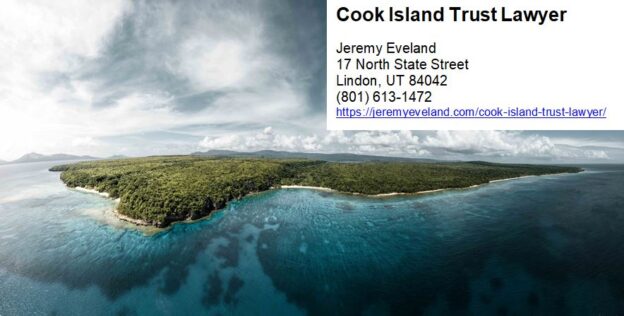Imagine having a secure and effective method to protect your assets on an international level. With offshore trusts, you can do just that. In this insightful article, we will explore the concept of offshore trusts and how they serve as a legal tool for safeguarding your hard-earned wealth. Delve into the world of international asset protection and discover the benefits that come with it. Protect your assets and gain the peace of mind you deserve by consulting with attorney Jeremy Eveland and exploring the possibilities that offshore trusts offer.
What is an offshore trust?
An offshore trust is a legal arrangement where a trustee holds assets, such as money, property, or investments, on behalf of beneficiaries in a jurisdiction different from the one where the settlor resides. The purpose of an offshore trust is to provide a range of benefits, including asset protection, tax minimization, financial privacy, risk diversification, and estate planning advantages.
Definition and purpose of offshore trusts
An offshore trust is a trust established in a foreign jurisdiction, offering various advantages to individuals and families seeking to protect their assets. By transferring assets to an offshore trust, the settlor effectively creates a separation between themselves and their assets, reducing their exposure to legal risks, taxation, and other potential challenges. The purpose of an offshore trust is primarily to safeguard and maximize the wealth of the settlor and their beneficiaries.
Key features of offshore trusts
Offshore trusts possess several key features that distinguish them from onshore trusts. One significant feature is the ability to select a jurisdiction with favorable laws and regulations, offering greater asset protection and tax advantages. Offshore trusts also provide a level of financial privacy, as the laws in some jurisdictions may restrict the disclosure of trust details. Additionally, offshore trusts allow for the diversification of assets across multiple jurisdictions, reducing the risk of being subject to changes in a single country’s political or economic environment. Lastly, offshore trusts often offer flexible estate planning options, allowing the settlor to provide for future generations and protect family wealth.
Why use an offshore trust?
There are several compelling reasons to consider using an offshore trust as part of your asset protection and wealth management strategy.
Protecting assets from civil litigation
One of the primary benefits of an offshore trust is the potential to shield assets from civil litigation. By transferring assets to a trust located in a favorable jurisdiction, you can create a legal barrier between your personal wealth and potential creditors. If there is ever a legal dispute, the assets held in the offshore trust may be protected from seizure, ensuring the preservation of your wealth.
Minimizing taxation
Another advantage of utilizing an offshore trust is the potential for tax minimization. Different offshore jurisdictions offer various tax advantages, such as lower capital gains tax rates or the absence of certain taxes. By carefully selecting the jurisdiction, you can optimize your tax planning and reduce your overall tax liabilities, thus maximizing the growth and preservation of your assets.
Maintaining financial privacy
Offshore trusts provide an additional layer of financial privacy. In some jurisdictions, the details of a trust can remain confidential, preventing unwanted scrutiny and protecting your personal and financial information from public disclosure. This increased privacy can help safeguard your wealth, allowing you to maintain a low profile and avoid becoming a target for potential legal or financial adversaries.
Risk diversification
Investing in multiple jurisdictions is an effective risk management strategy. By establishing an offshore trust, you can diversify your assets across geographically diverse regions, reducing your exposure to political instability, economic crises, or currency fluctuations. This diversification serves as a form of insurance against any single country’s economic volatility, providing a safeguard for your wealth.
Estate planning benefits
Offshore trusts offer a range of estate planning benefits. By structuring your assets within a trust, you can ensure the smooth transfer of wealth to future generations. You may specify how and when your assets are distributed, protecting your beneficiaries and preserving family wealth for the long term. Additionally, offshore trusts provide a mechanism to shield your assets from potential claims by disgruntled family members or other individuals, ensuring your intentions are honored even after you are no longer present.
Choosing the right jurisdiction
Selecting the most suitable jurisdiction for your offshore trust is crucial to ensure optimal asset protection and tax advantages. Several factors should be considered when making this decision.
Factors to consider
When choosing a jurisdiction, it is essential to assess the legal system, political stability, and reputation of the country or territory. Jurisdictions with well-established legal systems and a robust body of trust law are often preferable, as they offer greater trust protection and stability. It is also important to consider the political stability and economic climate of the chosen jurisdiction to mitigate risks associated with political turmoil or economic crises.
Another critical factor to evaluate is the jurisdiction’s tax regulations. Look for jurisdictions that offer favorable tax incentives, such as exemption from certain taxes, low withholding tax rates, or no taxation on capital gains or inheritance. Additionally, consider the confidentiality of the jurisdiction’s banking and legal systems to protect your financial privacy effectively.
Popular jurisdictions for asset protection trusts
There are several jurisdictions recognized for their favorable asset protection laws and tax advantages. Some popular offshore trust jurisdictions include:
- The Cayman Islands: Known for its robust trust legislation, the Cayman Islands offers a well-regulated financial environment, a favorable tax regime, and strong asset protection provisions.
- Switzerland: Switzerland provides a long-standing history of financial stability, offering trust structures that facilitate asset protection and tax efficiency.
- Singapore: With its strong legal framework and stable economy, Singapore is an attractive jurisdiction for asset protection trusts. It offers a favorable tax regime and confidentiality protections.
- Isle of Man: Known for its robust trust legislation and political stability, the Isle of Man provides favorable asset protection and a business-friendly environment.
Each jurisdiction has its unique advantages, so it is essential to consult with a legal professional experienced in offshore structures to determine which jurisdiction aligns best with your specific needs and objectives.
Setting up an offshore trust
While the process of setting up an offshore trust may vary depending on the jurisdiction, several key steps are typically involved.
Selecting a trustee
Choosing the right trustee is crucial for the successful establishment and management of an offshore trust. A trustee is responsible for managing and administering the trust assets in accordance with the trust deed and relevant laws. It is advisable to appoint a professional trustee with expertise in trust management, as they possess the necessary knowledge and experience to effectively fulfill their duties.
Drafting the trust deed
The trust deed serves as the legal document that outlines the terms and conditions of the trust. It specifies the rights and obligations of the settlor, beneficiaries, and trustee, as well as the purpose and objectives of the trust. The trust deed must be carefully drafted to ensure it aligns with the settlor’s intentions and complies with the laws of the chosen jurisdiction.
Transferring assets to the trust
To establish the offshore trust, the settlor must transfer ownership of their assets to the trust. This generally involves executing appropriate legal documents to effectuate the transfer, such as deeds, assignments, or contracts. It is important to ensure that the transfer of assets is completed in compliance with both the laws of the settlor’s home country and the chosen offshore jurisdiction.
Complying with local regulations
Every jurisdiction has its own regulations and requirements for establishing and maintaining an offshore trust. It is essential to comply with these regulations to ensure the trust’s validity and to preserve the asset protection benefits. This may involve submitting necessary documentation, filing annual reports, obtaining necessary licenses or permits, and adhering to any reporting obligations.
Obtaining tax benefits
One of the significant advantages of an offshore trust is the potential for tax benefits. By properly structuring the trust and selecting a favorable jurisdiction, you can maximize tax planning opportunities. It is crucial to consult with a qualified tax advisor to navigate the complex tax regulations and ensure compliance with both the settlor’s home country and the chosen jurisdiction’s tax laws.
Types of offshore trusts
Offshore trusts come in various forms and can be tailored to meet specific needs and objectives. The following are some commonly used types of offshore trusts.
Revocable trusts
Revocable trusts allow the settlor to retain control over the trust assets and modify or terminate the trust at any time. While they offer flexibility, these trusts may not provide optimum asset protection, as the assets remain within the control of the settlor.
Irrevocable trusts
Irrevocable trusts, as the name suggests, cannot be modified or revoked without the consent of the beneficiaries and the trustee. They offer stronger asset protection, as the settlor effectively relinquishes control over the trust assets. Irrevocable trusts may also provide tax advantages and greater privacy.
Spendthrift trusts
Spendthrift trusts are designed to protect the trust assets from the beneficiary’s creditors. The trust’s terms and conditions may restrict the beneficiary’s ability to transfer or sell their interest in the trust, ensuring the assets are shielded from potential creditors.
Dynasty trusts
Dynasty trusts are created to provide for future generations. They are designed to last for multiple generations, preserving family wealth and ensuring a smooth transition of assets. Dynasty trusts often include provisions that mitigate estate taxes and protect the trust assets from creditors or divorcing spouses of the beneficiaries.
Understanding the role of the trustee
The trustee plays a vital role in an offshore trust, and understanding their duties and responsibilities is essential.
Duties and responsibilities
The trustee is responsible for managing and administering the trust in accordance with the trust deed and applicable laws. Their duties include safeguarding the trust assets, distributing income or principal to beneficiaries as specified in the trust deed, making investment decisions, and ensuring compliance with all legal and reporting requirements. The trustee must act in the best interests of the beneficiaries and exercise their duties with care, skill, and diligence.
Choosing a professional trustee
Selecting a professional trustee is often recommended to ensure the effective management of the offshore trust. Professional trustees have the expertise and resources to fulfill their duties and obligations effectively. They possess a deep understanding of trust law, investment strategies, and compliance requirements. Engaging a professional trustee provides peace of mind and enhances the integrity and credibility of the trust.
Challenges and risks associated with offshore trusts
While offshore trusts offer significant benefits, it is important to be aware of potential challenges and risks.
Increased regulatory scrutiny
Offshore trusts have faced increased regulatory scrutiny in recent years as governments strive to combat money laundering, tax evasion, and other illicit activities. Stricter reporting requirements and more robust regulatory frameworks have been put in place, increasing transparency and compliance obligations. It is essential to stay informed and ensure compliance with all relevant regulations to avoid legal and reputational risks.
Potential for legal challenges
Offshore trusts may be subject to legal challenges in certain jurisdictions. Creditors, disgruntled family members, or other parties may seek to challenge the validity of the trust or claim a share of the trust assets. Proper structuring, compliance with local laws, and working with experienced legal professionals can help mitigate the risk of legal challenges.
Tax reporting obligations
Offshore trusts often have tax reporting obligations in both the settlor’s home country and the chosen jurisdiction. Failure to comply with these reporting requirements can result in severe penalties and legal consequences. It is essential to engage qualified tax advisors and fulfill all necessary tax reporting obligations to ensure compliance with applicable tax laws.
How offshore trusts protect assets
Offshore trusts provide various forms of asset protection, shielding wealth from potential threats.
Creditor protection
One of the primary benefits of an offshore trust is creditor protection. By transferring assets to an offshore trust, the settlor effectively places a legal barrier between their personal wealth and potential creditors. In the event of a lawsuit or legal claim, the trust assets are typically protected and shielded from seizure.
Protection from divorce settlements
Divorce settlements can pose a significant risk to an individual’s wealth. By establishing an offshore trust, assets can be protected from being divided or subject to claims during divorce proceedings. This can prevent the dissipation of wealth and ensure the preservation of assets for the benefit of the settlor and their intended beneficiaries.
Shielding assets from political instability or economic crises
Investing in multiple jurisdictions through an offshore trust can provide protection against political instability or economic crises in a single country. By diversifying assets across geographically diverse regions, the trust assets are less vulnerable to changes in a single country’s political or economic environment. This diversification helps mitigate risks associated with local economic downturns, ensuring the preservation and growth of wealth.
Common misconceptions about offshore trusts
There are several misconceptions about offshore trusts that need clarification.
Offshore trusts are only for the ultra-wealthy
Contrary to popular belief, offshore trusts are not only for the ultra-wealthy. While they do offer substantial benefits to high-net-worth individuals, offshore trusts can be utilized by individuals and families with varying levels of wealth. Depending on your specific circumstances and asset protection needs, an offshore trust can be a valuable tool for safeguarding and maximizing your wealth.
Offshore trusts are illegal or shady
Offshore trusts are often mistakenly associated with illegal activities or shady practices. It is important to understand that an offshore trust is a legitimate legal structure used by individuals and families worldwide. When properly established and managed, offshore trusts comply with all applicable laws and regulations, providing a transparent and secure mechanism for asset protection and wealth management.
Offshore trusts are purely for tax evasion
While offshore trusts can offer tax advantages, it is crucial to distinguish between tax planning and tax evasion. Tax planning involves utilizing legal strategies to minimize tax liabilities within the boundaries of the law. Tax evasion, on the other hand, involves illegal activities to evade or evade taxes. Offshore trusts can be used for legitimate tax planning purposes, ensuring compliance with all applicable tax laws.
Case studies of successful asset protection using offshore trusts
To illustrate the effectiveness of offshore trusts in various scenarios, here are three case studies showcasing successful asset protection strategies.
Case study 1: Protecting family wealth from a business lawsuit
John, a successful entrepreneur, wanted to protect his substantial personal wealth from potential legal claims related to his business. By establishing an offshore trust in a jurisdiction with robust asset protection laws, John effectively shielded his personal assets from any potential lawsuits against his business. As a result, even in the event of litigation, his personal wealth remains safeguarded, ensuring his financial security and the well-being of his family.
Case study 2: Safeguarding assets during a divorce settlement
Sarah, a wealthy individual going through a difficult divorce, utilized an offshore trust to protect her assets from being divided during the divorce settlement. By transferring assets to the trust, Sarah effectively created a separate legal entity that was not subject to the division of marital property. This allowed her to retain control and ownership of her assets, ensuring the preservation of her wealth and protecting her financial future.
Case study 3: Shielding assets from political turmoil
Mark, a high-net-worth individual residing in a politically unstable country, established an offshore trust to protect his assets from potential upheaval. By diversifying his assets across multiple jurisdictions through the trust, Mark effectively shielded his wealth from the risks associated with political instability. This strategy allowed him to maintain financial stability and protect his assets during times of economic uncertainty.
In conclusion, offshore trusts offer a range of benefits for asset protection, financial privacy, tax minimization, risk diversification, and estate planning. By choosing the right jurisdiction, establishing the trust correctly, and working with experienced professionals, individuals and families can effectively safeguard and maximize their wealth. While there are challenges and misconceptions to address, offshore trusts remain a legitimate and valuable tool for those seeking comprehensive international asset protection.







